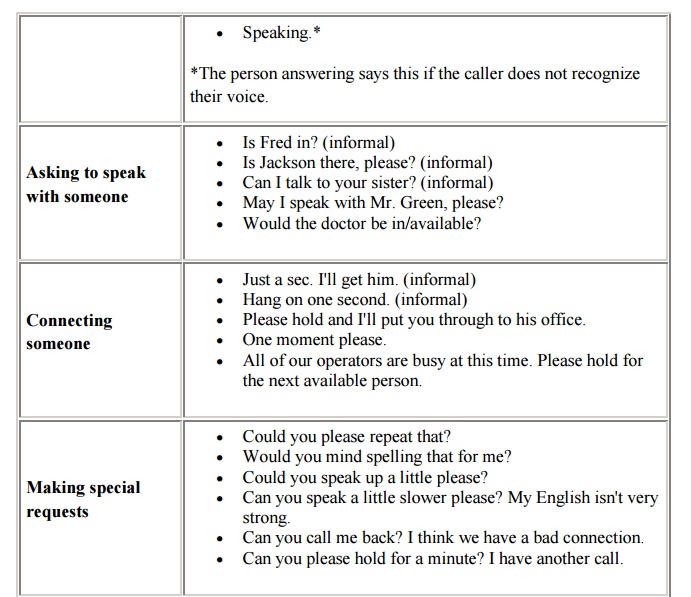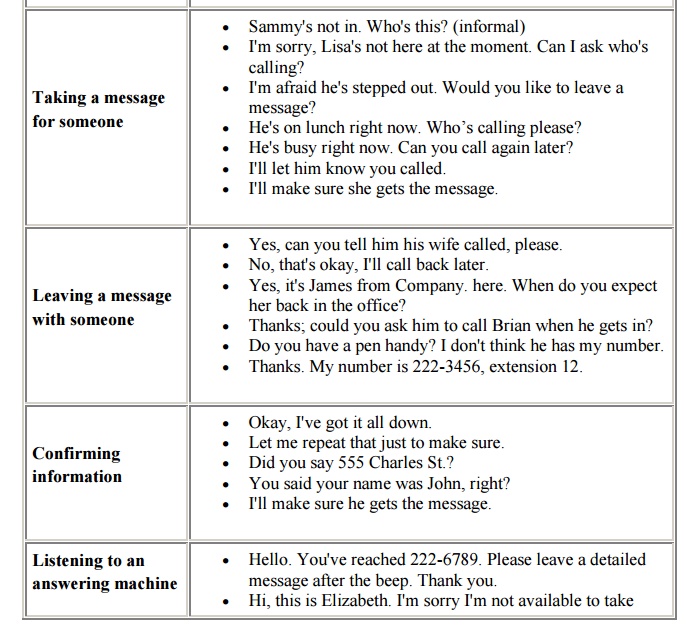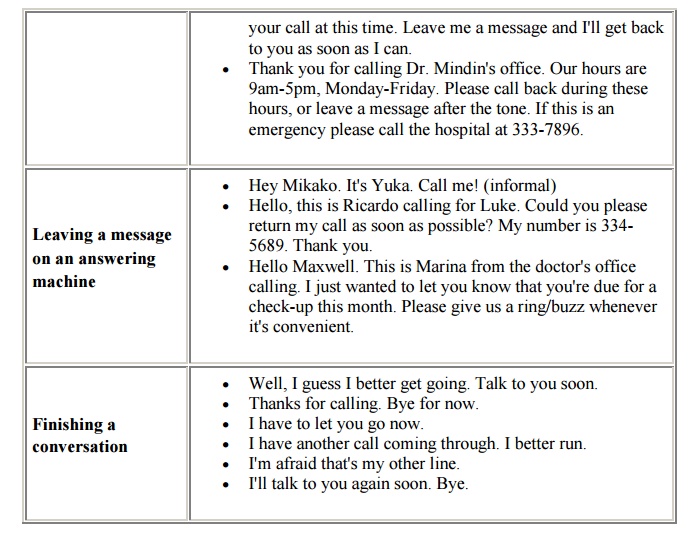Chapter: English
Telephone Conversations
Telephone Conversations
Having
telephone conversations in a second language can be very stressful. If you
don’t know what to say, it is very common to feel nervous in any conversation.
This is true even when speaking in your native tongue. One of the main reasons
people get nervous is because they aren’t prepared and know they might make
mistakes during the conversation.
To
improve confidence on the phone you must learn what to say. The first thing you
should do to improve your telephone communication ability is to start out small
by learning simple vocabulary and phrases. Start by knowing different
greetings. It is so easy when learning English to try to do too much too soon
and then get frustrated with not being able to speak as you had imagined. You
have to start small, gradually developing skills and slowly working up to
something more difficult.
Relax and
enjoy yourself as well. Everyone knows learning a language can be frustrating!
Don’t
worry if you make mistakes. Native speakers of English understand that you
won’t say everything the exact same way that they would. You shouldn’t feel
that you can’t make any mistakes, no one expects you to be perfect.
In the
following examples on English telephone conversations, we will give many
examples of sentences and phrases you should know. From the start until the end
of a telephone conversation we will go over everything all the way from
greetings to goodbyes.
Here are
a few sets of Telephone Conversations. Read the conversations in each set so
that you will become familiar with the typical words frequently used in
telephone conversations. Only over the period of time and after more practice
hours, you could master how to converse in telephone. You might have had many
such telephone conversations either in your social life or in your business
life. Share your blissful moments with us. You will be duly acknowledged.
Telephone Language
Here are some typical phrases that you can use in a telephone conversation.




Telephone Tips
Speak
slowly and clearly
Listening
to someone speaking in a second language over the telephone can be very
challenging because you cannot see the person you are trying to hear. However, it
may be even more difficult for the person you are talking with to understand
you. You may not realize that your pronunciation isn't clear because your
teacher and fellow students know and understand you. Pay special attention to
your weak areas (such as "r's" and "l's" or "b's"
and "v's") when you are on the phone. If you are nervous about using
the phone in English, you may notice yourself speaking very quickly. Practice
or write down what you are going to say and take a few deep breaths before you
make a phone call.
Make sure
you understand the other speaker
Don't
pretend to understand everything you hear over the telephone. Even native
speakers ask each other to repeat and confirm information from time to time.
This is especially important if you are taking a message for someone else.
Learn the appropriate expressions that English speakers use when they don't
hear something properly. Don't be afraid to remind the person to slow down more
than once. Keep your telephone in an area that is away from other noise
distractions such as a radio or television.
Practice
with a friend
Ask
another student to practice talking on the phone with you. You might choose one
night a week and take turns phoning each other at a certain time. Try to talk
for at least fifteen minutes. You can talk socially, or role play different
scenarios in a business environment. If you don't have access to a telephone,
you can practice by setting two chairs up back to back. The most important
thing about practicing telephone English is that you aren't able to see each
other's mouths. It is amazing how much people lip-read without realizing.
Use
businesses and recordings
There are
many ways to get free telephone English practice. After business hours,
you can
call and listen to recorded messages. Write down what you hear the first time,
and then call back and check if your notes are accurate. Use the phone in your
everyday life. Call for a pizza delivery instead of going out to eat. Call a
salon to book a hair appointment. You can even phone the movie theatre to ask
for the listings instead of using the newspaper. Some large cities have free
recordings you can call for information such as your daily horoscope or the
weather. (Make sure that you aren't going to get charged for these numbers
first.) Some products have free phone numbers on the packaging that you can
call for information. Think of a question you might want to ask and call the
free number! For example, call the number on the back of the cereal box and ask
for coupons. You will have to give your name and address. Make sure you have a
pen handy so that you can repeat the information and check your comprehension.
Learn
telephone etiquette (manners)
The way
that you speak to your best friend on the phone is very different to the way
you should speak to someone in a business setting. Many ESL speakers make the
mistake of being too direct on the telephone. It is possible that the person on
the other line will think that you are being rude on purpose if you don't use
formal language in certain situations. Sometimes just one word such as
"could" or "may" is necessary in order to sound polite. You
should use the same modals you would use in a formal "face-to-face"
situation. Take the time to learn how to answer the phone and say goodbye in a
polite manner, as well as all the various ways one can start and end a
conversation casually.
Practice
dates and numbers
It only
takes a short time to memorize English Phonetic Spelling, but it is something that you will
be able to use in any country. You should also practice saying dates and
numbers aloud. You and a friend can write out a list of dates and numbers and
take turns reading them over the phone to each other. Record what you hear.
Swap papers the next day and check your answers. Click here to learn more about numbers.
Mock Job Interview
Use this
mock job interview to practice for the real thing. The more you practice the
better prepared and more confident you will be for your interview. We have
developed a realistic job interview role play for you to use with someone to
play the role of the interviewer.
Key to a
productive mock interview is constructive feedback. The feedback guide after
each section ensures the feedback you receive is relevant and helpful.
Go
through the mock interview questions and answers and be ready for your job
interview.
Have on hand for your mock interview
your company research
copies of your resume and cover letter
a list of job references
notebook and pen
work samples if relevant
Know how
to research the company before your interview.
Be ready
with everything you might need with this interview checklist
2. Introduction
The
interviewer introduces him or herself.
Feedback
- Does the candidate
use a firm handshake, make direct eye contact and
smile
use the interviewer's name in greeting eg. "I
am pleased to meet you, Mrs Jones"
wait to be asked to sit down
puts documents on the table rather than on his or
her lap
place the handbag or briefcase at their feet
Make
small talk
The
interviewer attempts to put the candidate at ease with some small talk such as
"Did you find us easily?" or a comment about the weather.
Feedback
- Does the candidate
sit upright but not too stiffly in the chair
lean forward very slightly to show interest
answer these informal questions confidently
Begin positively by not complaining about the
journey or traffic
thank the interviewer for the opportunity to
discuss the job
Discuss
the company and position
After
some small talk the interviewer begins by briefly discussing the company, the
department and the position itself.
Feedback
- Does the candidate
listen attentively and not interrupt
display appropriate, interested, body language
use the opportunity at the end of this description
to demonstrate their research on the company with a relevant comment such as
"I was interested to read that you are opening 3 new branches this
year"
Ask
common job interview questions
The
interviewer asks standard job interview questions starting with these top 6
interview questions:

Get help
with this standard part of the job interview at mock job interview questions and answers.
Use these
free job descriptions to get a clear picture of the job
you are interviewing for.
6. Ask Behavioral Interview Questions
The
interviewer asks behavioral interview questions that explore the competencies
or behaviors relevant to the job opportunity.
The most
common competencies explored in a job interview include planning and
organizing, problem-solving, work standards, team work and communication
skills. These are the sample behavioral questions that assess these
competencies.
"How
have you established your work priorities in your previous job?"
"Tell
me about a recent time you had to solve a difficult problem in your job"
"Describe
a situation where you were not satisfied with your work performance. What did
you do?"
"Describe
a time when you contributed more than required to the team"
"Tell
me about a difficult customer/colleague you had to deal with."
Feedback
- Does the candidate
understand the concept of behavioral
interview questions
provide a relevant and concise
behavioral example quickly and clearly
outline the steps the candidate
personally took to reach a positive outcome
provide a valid example that shows
evidence of the required competency
You can
find a complete guide to behavioral interview questions with sample behavioral
answers at the behavioral interview guide
7. Ask some difficult interview questions
These
will explore red flags in your resume such as gaps in employment, lay offs and
dismissals.
Feedback
-Does the candidate
stay calm when answering tough interview questions
use the right tone of voice and not get defensive
give concise responses
adequately explain to the interviewer about the
problem area
Get help
with answering difficult interview questions at job interview answers to tricky questions.
8. Ask the candidate if he or she has any questions
At this
point the interviewer asks if you have any questions you want to ask.
Feedback
- Does the candidate
have about 5 good questions ready to ask
not ask for information that has already been
provided during the interview
asks questions that show he or she has thought
about the company and the job opportunity
avoid the wrong type of questions such as those
about benefits and salary
This list
of the right job interview questions to ask will help you prepare for this
part of the mock job interview.
9. Close the interview
The
interviewer thanks the candidate and indicates what the next step in the hiring
process is.
Feedback
- Does the candidate
make a positive closing statement like "I am
excited about this opportunity and believe my experience and enthusiasm will
add value to your company"
ask the interviewer if there are any issues still
to be addressed
thank the interviewer for their time
Know how
to close the job interview.
10. Provide general feedback for a mock job
interview
Does the
candidate
use appropriate body language
use proper verbal communication skills
display enthusiasm for the job opportunity
Interview
questions for specific jobs can be found at job interview guides
Improve
your chances of success with a mock job interview. Keep practicing till you
feel ready and confident of acing the actual interview!
Related Topics